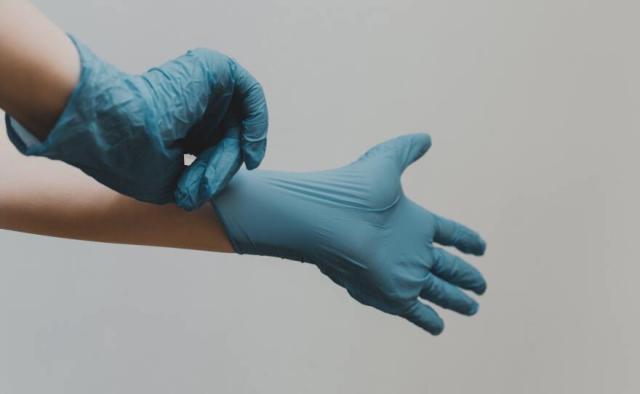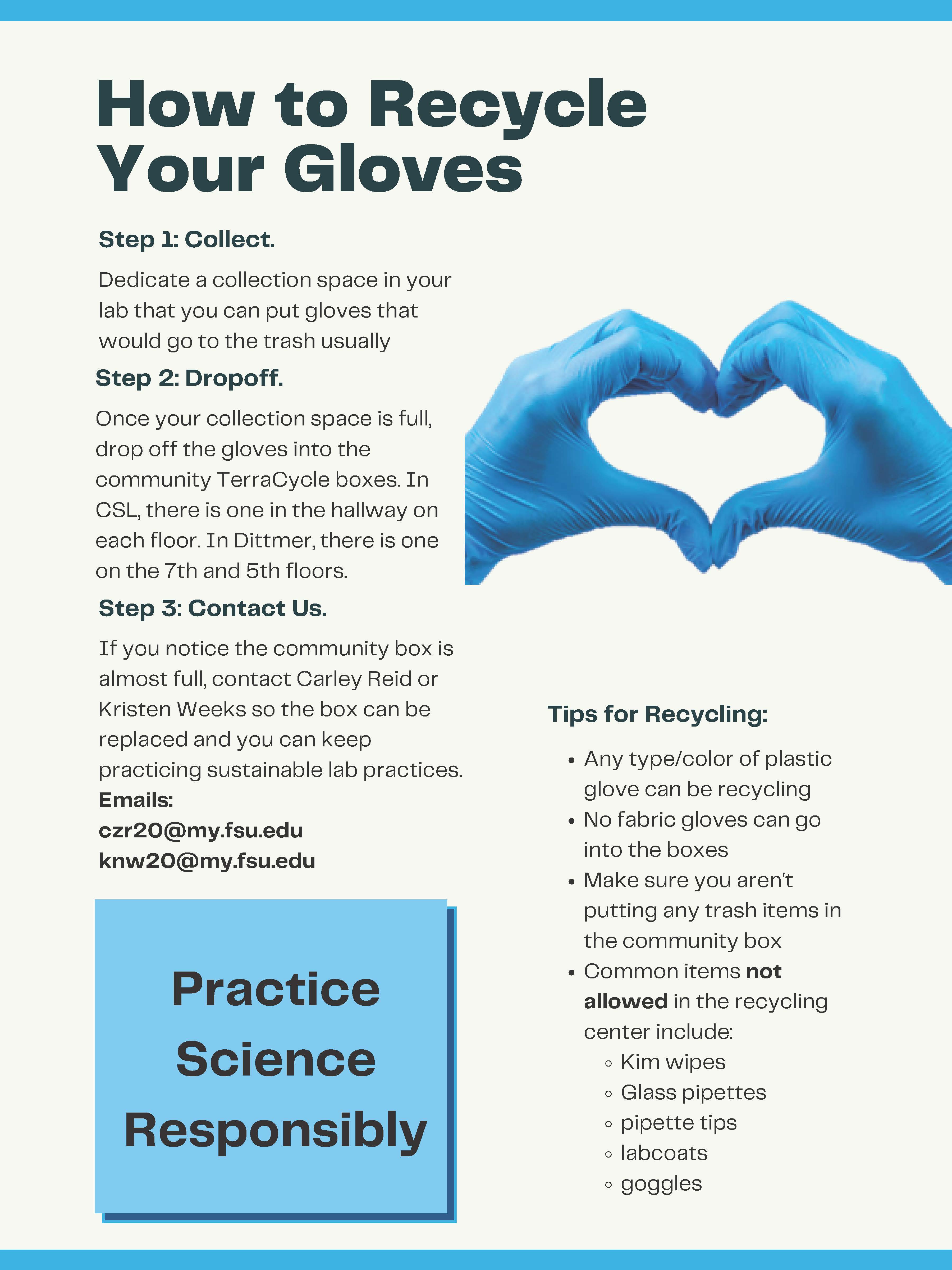Chemistry & Biochemistry Department Sustainably Disposes of Single-Use Lab Plastics

Through the support of an FSU Green Fund Project Grant, the Chemistry & Biochemistry Department has enacted the first glove-recycling program at FSU. In laboratory settings, single use plastics are a necessity for safety and sterility. However, their use results in approximately 5.5 million tons of plastic lab waste annually (Urbina et al., 2015).
PhD students Kristen Weeks and Carley Reid became aware of this issue in the summer of 2021. In response, they conducted a departmental survey to assess the single-use plastics burden of the graduate level chemistry and biochemistry labs at FSU. They found that the department used and disposed of 46,800 pairs of gloves over a three-month period, which is equivalent to 1,170 pounds of plastic waste. They estimated that over the course of a year, the department produced about 5,000 pounds of plastic waste from gloves alone.
“As scientists, we recognize that single use plastics are a necessity,” Weeks and Reid wrote in their Green Fund application, “but it is still our responsibility to work more sustainably. We as a community feel it is our duty to reduce plastics waste in the laboratory and inspire other departments at Florida State to take action for the environment”
To address this problem, Weeks and Reid looked to leading research institutions such as Harvard, MIT, and Stanford. They discovered that these institutions recognized and addressed their laboratory waste issues with a TerraCycle glove recycling program. Through this program, boxes are purchased and filled with used gloves before they are sent back to TerraCycle and upcycled into community items such as park benches.
With the unanimous support from Chemistry & Biochemistry faculty, Weeks and Reid applied for a Green Fund Project Grant and were awarded $4,470.72. Over the course of the Spring 2022 semester, Weeks and Reid used the funding to purchase TerraCycle boxes for six floors of research laboratories in the department. After placing each box, Weeks and Reid created and placed flyers above each box which summarized the process.
Next, Weeks and Reid met with FSU’s Alpha Chi Sigma (AXE) chemistry fraternity to recruit volunteers. The student volunteers helped monitor, pack, and repurchase boxes as well as document the weight of gloves recycled. Weeks and Reid also collaborated with Environmental Health and Safety (EH&S) to incorporate the use of the glove boxes into monthly training seminars to ensure that only safe glove waste was being recycled.
Finally, Weeks and Reid compiled comprehensive protocols and resources outlining their project, including SOPs, an Excel spreadsheet for data collection and organization, flyers, and other miscellaneous suggestions. Weeks and Reid also canvassed labs in the department to clarify questions about the program and encourage participation from labs that had not yet adopted glove recycling.
 By the end of the semester, Weeks and Reid had collected 48.3 lbs of gloves over 80 days, which is the equivalent weight of 68 boxes of VWR single use gloves. In addition, Weeks and Reid learned how to design and implement a department-wide program, gained an understanding of the waste-management process, and thought critically about translating their efforts for others to implement the program in the future. Their project volunteers earned community service hours, and the entire Chemistry & Biochemistry Department gained an increased awareness of their sustainability in the lab.
By the end of the semester, Weeks and Reid had collected 48.3 lbs of gloves over 80 days, which is the equivalent weight of 68 boxes of VWR single use gloves. In addition, Weeks and Reid learned how to design and implement a department-wide program, gained an understanding of the waste-management process, and thought critically about translating their efforts for others to implement the program in the future. Their project volunteers earned community service hours, and the entire Chemistry & Biochemistry Department gained an increased awareness of their sustainability in the lab.
One challenge the team faced was effective communication with custodial staff. One TerraCycle box was mistakenly thrown away, and Weeks and Reid learned that they had to prioritize frequent face-to-face communication with custodial staff to ensure everyone was aware of the new recycling initiative. The team also noted that other departments interested in glove recycling should establish a relationship with EH&S to discuss specific hazards since only non-hazardous gloves can be recycled.
Overall, the team was very pleased with the organization of the project and the enthusiasm of the Chemistry & Biochemistry students and faculty. Weeks and Reid noted that their collaborations with EH&S and AXE were particularly impactful in helping incorporate sustainability into the culture of the department.
“My involvement in this project has been a valuable experience for my career,” said Weeks. “Along with my project co-lead, I was able to execute an entire sustainability project from grant proposal writing to implementation of the program. I learned the value of effective communication, and the project was an important leadership experience.”
Reid noted that the recycling program was particularly meaningful because it could serve as a successful pilot program for other departments in the university.
“Without the Green Fund grant, we may never have been able to implement a project on this scale,” said Reid. “The project has given us a platform to incorporate sustainability into the culture of our department. We are very grateful for the enthusiasm and support from Sustainable Campus because the project has truly been a joy to work on.”
Works Cited
Urbina, M.A. et al. (2015). Labs should cut plastic waste too. Nature, 528, 479. https://doi.org/10.1038/528479c.
